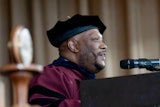The Democratic National Convention held in Chicago was a celebration of Vice President Kamala Harris, now the party’s official nominee for President of the United States. Researchers Dr. Terrell Strayhorn and J’Quen Johnson noticed it wasn’t just Harris in the spotlight, but her alma mater and sorority as well.
Harris attended Howard University, one of the country’s 101 historically Black colleges and universities (HBCUs) and became a member of Alpha Kappa Alpha (AKA) Sorority, Inc., one of the historically Black sororities and fraternities known collectively as The Divine Nine.
 J'Quen Johnson, a Ph.D. candidate at the University of the Cumberlands and director of research at Do Good Work.
J'Quen Johnson, a Ph.D. candidate at the University of the Cumberlands and director of research at Do Good Work.
‘The Kamala Effect’: Measuring Harris’s Influence on HBCUs, was published this month by Do Good Work LLC, a consulting group working to improve student success. Strayhorn is CEO and president of Do Good Work, as well as the director of research at VUU’s Center for the Study of HBCUs. Johnson is a Ph.D. candidate at the University of the Cumberlands and director of research at Do Good Work.
To conduct their research, Strayhorn and Johnson used an online tool which scraped data from Facebook, Instagram, LinkedIn, and X (formerly Twitter). The two began looking for six key performance indicators within social media posts, assessing for mentions, sentiments, interactions, likes, and shares associated with Harris and HBCUs.
Posts were analyzed over two set periods of time: just before Harris announced she was officially running for president (July 15–20) and shortly after (July 21–26). They looked for hashtags like #HBCUgrad, #HBCUpride, #HBCUlove, and #madamepresident.
“We saw an uptick across the board in interactions, shares, and likes,” said Johnson.
In fact, the report shows that the total number of interactions around HBCU-centered social media posts increased by 45.2% in the six days after her announcement. Likes on posts about HBCUs increased by 44.75%. Johnson said, after July 21, when Harris stepped into the race, the Democratic Party “became alive again.”
The increase in HBCUs and Harris associations didn’t just happen in the U.S. or Canada. Geolocating data revealed a large concentration of posts from Chile, Jordan, the Netherlands, and India.
“If you look at India, this is likely expressions reflecting cultural pride and support from fellow Southeast Asians and others in the region who are aware of and acknowledging Harris’s HBCU history,” said Strayhorn. Dr. Terrell Strayhorn
Dr. Terrell Strayhorn
While their study saw overall more positive mentions regarding HBCUs, they also noticed a corresponding increase in negative engagement around HBCUs. Johnson and Strayhorn agree this should be a warning to institutional leaders at HBCUs to anticipate more criticism and attacks, especially if Harris wins the election in November.
The researchers pointed out that this examination of Harris’s impact was not done with an intent to reduce her humanity. In fact, they hope their work sheds light on the complexities of her experience, how Harris represents multiple intersections of identity and, even just as a candidate, is already breaking historical ground.
Strayhorn and Johnson also agree that it will be interesting to study Harris’s potential impact on HBCUs through November and beyond. They wonder if her spotlight could increase interest, applications, and enrollment numbers at HBCUs, or if her AKA membership will see more young women embracing its pink and green colors.
But one thing that they said is certain: Harris’s nomination will have an impact on young girls of color.
“This is what’s possible when America lives up to its values, making sure that everyone, including Black women, have access to living their dreams, sitting in the highest seat of leadership,” said Strayhorn. “We do believe the Kamala Effect will be observed for years to come.”
















